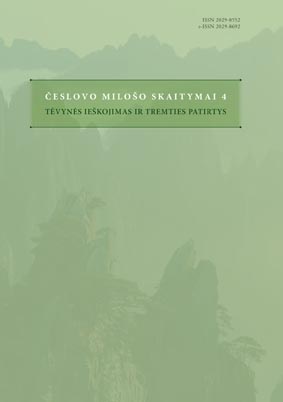Česlovo Milošo kelionės 5 praeitį jo eseistikoje: santykio su savo paties praeitimi Ir Lietuvos istorija Paieškos
Journeys to the Past in Czesław Miłosz’s Essays: Search for Relation with His Own Past and the Lithuanian History
Author(s): Vaiva NarušienėSubject(s): Literary Texts
Published by: Vytauto Didžiojo Universitetas
Keywords: atmintis; eseistika; Lietuvos istorija; Česlovas Milošas; praeitis; essayistic; Lithuanian history; memory; Czesław Miłosz; past
Summary/Abstract: One of the most significant motives in Czesław Miłosz’s creative work is returning to the past. He constantly looks back at it trying to ground his identity, understand history and its relation with the present, discover the ties among people and nations. This article presents Czesław Miłosz’s viewpoint on his own biography and the Lithuanian history, revealed in his essays, as well as his relation with past and future. Miłosz’s own past and roots are the source of strength that prevents him from loosing the individuality and guiding values. In his stories, the prevailing motif is his childhood and youth memories as they embody the foundations of his identity that ground his latter beliefs and choices. Miłosz perceives his personal past as inseparable from the history of Lithuania, his native country and, especially, Vilnius, the city of his youth. As a civil of the former Grand Duchy of Lithuania, Miłosz constantly searches the Lithuanian history to find the grounds for his self-consciousness and links between the people and nations related to this land. For this reason, the focus of his texts is directed to the period of the Polish–Lithuanian Commonwealth, especially the 19th and the beginning of the 20th century. Then, the events and ideas had the most influence on the formation of the modern Poland and Lithuania and their present-day relations. When Miłosz speaks about the common past of these countries, he constantly emphasizes that national, cultural and religious tolerance is the grounds for neighbourly consensus. In his opinion, new relationship between the Poles and Lithuanians may be effectively developed only with the understanding of their own past.
Journal: Česlovo Milošo skaitymai
- Issue Year: 2011
- Issue No: 4
- Page Range: 140-147
- Page Count: 8
- Language: Lithuanian

